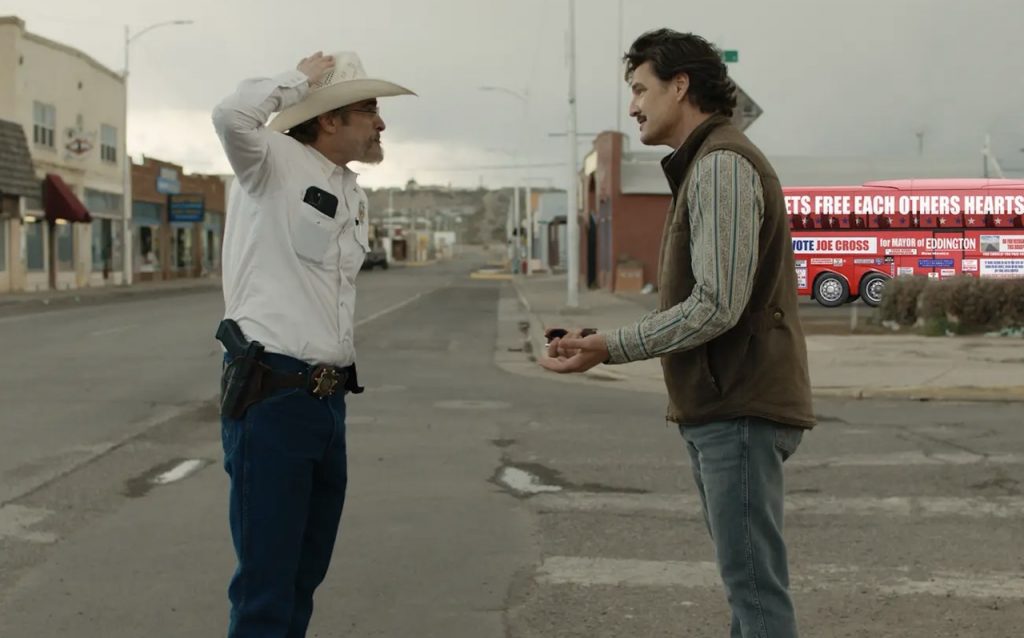Ari Aster returns with his most frustratingly brilliant work yet – a searing, exhausting examination of American society through the lens of a fictional New Mexico town during COVID-19’s most divisive period.
Eddington is less a traditional western than it is a political Jackson Pollock painting, splattered with every contentious opinion that emerged in 2020, from mask mandates to Black Lives Matter protests to conspiracy theories.
The film is set in May 2020 in the small town of Eddington, New Mexico, and follows Sheriff Joe Cross (Joaquin Phoenix), a washed-up police chief whose frustrations with COVID restrictions spark his impulsive decision to challenge incumbent Mayor Ted Garcia (Pedro Pascal) in a bitter electoral battle. But beneath this political framework lies something far more psychologically complex – a study of control, masculinity, and the toxic echo chambers that have consumed societal discourse.
Phoenix delivers another powerfully unhinged performance as Joe, a man whose every decision stems from his desperate need to regain control over a life spiralling beyond his grasp. One of the film’s big successes lies in making Joe just sympathetic enough to follow his emotional reasoning, even as his actions become increasingly detached from both morality and reality. His battle against mask mandates isn’t really about health concerns – it’s about authority, freedom, and his crumbling sense of purpose as both sheriff and husband.
Living with Joe are his emotionally distant wife Louise (Emma Stone) and her conspiracy theory-obsessed mother Dawn (Deirdre O’Connell), creating an unbearably toxic living environment. I found O’Connell’s portrayal of Dawn to be captivating – a manipulative figure who weaponises both conspiracy theories and family trauma, all while constantly comparing Joe to his deceased father-in-law, whose shrine dominates their living space. A question she poses to Joe – “where do you put your anger?” – becomes key to understanding the film at large, and particularly a violent downward spiral in the film’s third act.
Stone’s performance captures something frighteningly real about emotional guardedness. When charismatic cult leader Vernon Jefferson Peak (Austin Butler) enters their lives, offering Louise the belonging she desperately craves, it exposes how easily people can be drawn into dangerous ideologies when starved of genuine connection.
What makes Eddington so unsettling for me was how accurately it depicts the way online influences create isolated bubbles of reality. Each character seems to inhabit their own personalised version of truth, but the claustrophobic nature of small-town life forces these incompatible worldviews into violent collision. Mayor Garcia, while positioned as Joe’s political opponent, is no heroic figure – Pascal imbues him with a calculating smugness that reveals a different, more subdued version of male aggression beneath his progressive facade.
Another one of the film’s more prescient observations is how digital culture radicalises in every direction. Young activists engage in performative virtue signalling, conspiracy theorists find validation for increasingly outlandish beliefs, and every confrontation becomes viral content. The characters are possessed by their ideologies, trapped in echo chambers of their own making. It’s a nasty mirror held up to any society that seemed to lose the capacity for empathy during a divisive period.
Despite being Aster’s most visually muted and grounded film, Eddington showcases fantastic cinematographic skill. The New Mexico landscape provides a striking backdrop for the unfolding chaos, while the film’s genre-switching prowess becomes evident during tension-filled sequences and more action-heavy scenes. Moments of violence are cut with the same precision that made Aster’s previous works so viscerally effective, though here serving a more realistic, less supernatural horror.
The film’s 149-minute runtime can feel punishing, and that appears entirely intentional. Eddington guarantees it will frustrate viewers – not through mean-spiritedness, but through its remarkable ability to hold up an unforgiving mirror to very recent history. Watching these realistic depictions of heavy topics effectively drags you back into that dumpster fire of 2020 discourse, and the film makes no attempt to make this experience enjoyable.
While Austin Butler and Emma Stone deliver excellent performances, their interconnecting relationship feels criminally underused – in my opinion one of the film’s biggest missteps. Their dynamic, and how it contrasts with Louise’s relationship with Joe, deserved more exploration to fully develop its thematic potential.
The film’s billing as a “modern western” both works and slightly disappoints. It subverts western tropes by refusing good-versus-evil narratives, instead presenting deeply flawed characters whose moral failings reflect broader societal dysfunction. Yet this descriptor can feel misleading – perhaps it represents how Joe Cross might romanticise his own actions, viewing himself as some frontier sheriff fighting for justice when he’s actually spiralling into dangerous delusion.
Eddington succeeds as an uncomfortable reminder of how quickly civilised discourse can deteriorate when empathy breaks down. Despite its razor-sharp intentions and overwhelming wealth of ideas, I found that the film often struggles to guide viewers through its multitude of plot points toward meaningful catharsis. Instead, it left me with plenty to think about afterward – a delayed-release thought-bomb that continues detonating long after leaving the cinema. Whether this justifies nearly two and a half hours of deliberately challenging material depends entirely on your tolerance for Aster’s uncompromising vision of America’s fractured soul.
Author: Elliot, Holborn Store







